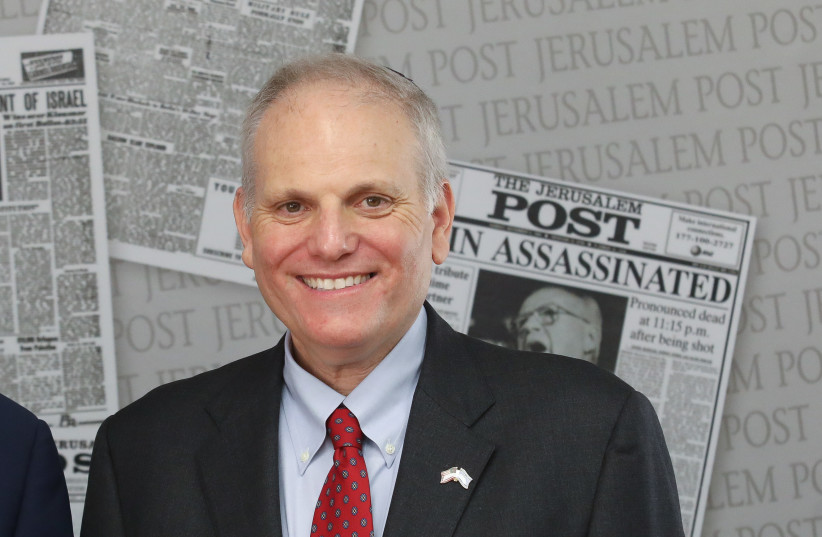Jews "can and should" move on from Ivy League universities, according to William Daroff, CEO of the Conference of Presidents of Major Jewish American Organizations.
Speaking to The Jerusalem Post during his third visit to Israel since the start of the Israel-Hamas war, he said, "If they don't want us, we should go elsewhere, and perhaps it will be instrumental in having the Ivy Leagues change their worldviews and how they interact and engage with Jewish students.
"If Jewish alumni stop giving money and Jewish parents stop paying tuition, hopefully, that will have an impact."
Daroff acknowledged that it is suboptimal to deny America's brightest Jewish students the opportunity for an Ivy League education and the associated prestige. He also expressed concern about influential institutions becoming devoid of Jewish presence. Nevertheless, he pointed out that the prevailing ideology on these campuses often focuses on which group is more oppressed than the other. This worldview portrays Jews and the State of Israel as "colonial oppressors."
"This is an ideology that the anti-Israel forces have been stirring and spreading," Daroff said.

He added that the December congressional hearing at which Harvard's Claudine Gay, University of Pennsylvania's Liz Magill (who has since retired) and MIT's Sally Kornbluth testified that whether calling for the genocide of the Jewish people is harassment is a "context-dependent decision" revealed the "intellectual academic nonsense emanating from the ivory tower of the Ivy Leagues, where they're so caught in the weeds of political correctness that they don't see the forest."
He said the hearing gave "good insight into the crisis in higher education. Daroff believes this is an opportunity for other universities like Vanderbilt, Emory, and Washington University, where there has been less antisemitism, to recruit Jewish students. It is also a good opportunity for Jewish parents and students to consider strongly where they spend their four years in university.
According to Daroff, October 7 opened the floodgates of latent antisemitism that was there before.
"The sewer covers popped open, allowing the filth of antisemitism to become more noticeable and pervasive," he said.
While antisemitism had been on the upswing for several years, specifically during the COVID-19 pandemic, he said the most troubling part of American Jews' post-October 7 reality was that alliances that the liberal Jewish community believed it had built throughout American civil society over decades ended up "not being there."
"I've been incredibly disappointed by our erstwhile allies who ended up not being there for us," Daroff said, naming women's groups, labor unions, and the LGBTQ+ community as the most disappointing. On the flip side, he noted, "We now know who our true friends are."
When asked if he believes that the Jewish community will be able to reconcile with these communities, he said, "I think we keep working with them to try to move them in the right direction, to try to educate them while recognizing that these relationships need to be two way, and at the moment they are not."
Images of Palestinian protests have become commonplace on college campuses and in the streets of major cities such as New York and Detroit. The most recent report by the Anti-Defamation League showed a striking more than 330% increase in antisemitic incidents in the two months after October 7. Students have been held up in hiding by violent protestors, and, in one instance, a Jewish man died when he was confronted by a pro-Palestinian advocate at a rally in Los Angeles.
Jews are afraid to wear Stars of Davids and yarmulkes in public in many instances. Some have chosen to remove their mezuzahs from their doorposts. And people like Daroff are advocating to keep Jews out of mainstream and influential schools of higher education for their safety.
Is America on the verge of another Holocaust?
"There are certainly red flags and similarities," Daroff admitted. "Before October 7, I was very focused on staying away from any Holocaust illusions or comparisons because of my strong belief in ensuring the uniqueness of the Holocaust. My thoughts on that have adjusted."
He said that the ostracizing of Jews, Jewish faculty and students, the boycotts of Jewish stores and Jewish restaurants, the graffiti, and the broken glass are reminiscent of darker days in Jewish history. The comparisons to the 1930s are impossible to avoid. But there is one significant difference: "The government is now on our side and is there to protect us," Daroff said.
The Nazi government was focused on killing the Jews. The czars of the Russian government targeted the Jews. In America, "we have unbelievably productive relationships with government at all levels, from the White House, the Justice Department, and the Department of Homeland Security to governors, mayors, and police chiefs. We know that we can count on them to be on our side.
"So, while there are certainly bright red flags, today's situation is better than it has been."
This is despite dozens of recent polls indicating that the younger generation – individuals between the ages of 18 and 30 – are skewing anti-Israel and pro-Palestinian. A recent Harvard University poll found that younger Americans overwhelmingly see not only Israelis but Jews as "oppressors."
These young people will be the country's future police chiefs, governors and senators.
"It's very worrying," Daroff said, shaking his head. But he said these same people are polling as uninformed or less informed of Israel and the Arab-Israeli conflict than their older counterparts.
"I'm hopeful that over time, as we and the Israeli government are better able to inform that population, they will come along," Daroff said. "It's tough to change minds in the heat of a conflict. But, God willing, the heat of the conflict will be less hot soon, and we'll be able to get into more proactive seeking to inform that age group."
